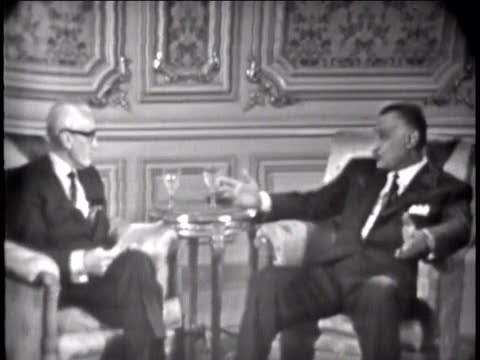News in Perspective; Special: An Interview with Egyptian President Gamal Abdel Nasser
- Series
- News in Perspective
- Producing Organization
- National Educational Television and Radio Center
- Contributing Organization
- Thirteen WNET (New York, New York)
- Library of Congress (Washington, District of Columbia)
- AAPB ID
- cpb-aacip-75-300zpg26
- NOLA Code
- NWIP
If you have more information about this item than what is given here, or if you have concerns about this record, we want to know! Contact us, indicating the AAPB ID (cpb-aacip-75-300zpg26).
- Description
- Episode Description
- President Nasser, interviewed in the Presidential Palace in Cairo by New York Times managing editor . "Clifton Daniel, stresses the conditions he says are necessary for peace in the Middle East. These are: (1) Israel must return all land captured in the "six day war" of June 1967; (2) Israel must take back all Palestinians displaced in 1948 and give them reparations and full citizenship. The Egyptian president said if Israel meets those conditions there will be peace and the Jewish state will also be permitted to use the Suez Canal. Nasser, however, rejected Israel's demand for face-to-face negotiations, insisting that Israel first must return occupied territories. Under present conditions, he said, "If we sit with them on (sic) a table to negotiate terms for peace, we'll be sitting on a table of capitulation, they will be in a position to dictate." Nasser also indicates that the Arab world will not accept a status quo for long. "I think there is a law, international law," he said, "if your country is occupied by armed forces, by your enemy, it is not only your right to liberate your country, but it is your duty." Nasser blamed the current artillery duels in the Suez area on the Israelis. He contended that the Israeli army, being positioned on the east bank of the Suez and facing populated areas and oil refineries, is pressing its advantage by starting the shelling. The Egyptian leader said that despite Soviet military aid and other help in building the Asian High Dam, the United Arab Republic is not under the influence of Russia. Nasser said he hoped for better relations with the United States, and asked the American people to be "evenhanded" in the Arab-Israeli conflict. "The only reason for conflict between the United States and the Arabs is the Israelis, and the United States taking the side of Israel." NEWS IN PERSPECTIVE is a production of National Educational Television. (Description adapted from documents in the NET Microfiche)
- Series Description
- This series of hour-long episodes goes behind the headlines of the past month and looks briefly ahead - at the places, people, and events that are likely to make headlines in the coming weeks. A distinguished team from The New York Times summarizes and interprets the major news developments throughout the world and provides a back ground for better understanding of probable future events. Each NEWS IN PERSPECTIVE episode is designed particularly to clarify the complexities of current history. Lester Markel is the editor-moderator of episodes 1 - 89. Clifton Daniel took over for Mr. Markel for the remainder of the series. Max Frankel, diplomatic correspondent for The Times in Washington, DC, and Tom Wicker, White House political correspondent for The Times, are guests on many episodes. Starting with episode 38, the switched switched from monthly to bi-monthly. One of the month's episodes would follow the standard format, with a host and usually Frankel and Wicker commenting on current events. The other episode would be focused on a particular topic and feature subject experts in addition to Times reporters. Throughout each episode maps, photographs, cartoons and slides are used to illustrate the topics under discussion. NEWS IN PERSPECTIVE is a production of National Educational Television, in cooperation with The New York Times. Episodes were frequently produced through the facilities of WNDT, New York. The facilities at WETA, in Washington DC, were used at times, in addition to other international locations. This series was originally recorded on videotape, sometimes in black and white and sometimes in color.
- Broadcast Date
- 1969-04-21
- Asset type
- Episode
- Topics
- Global Affairs
- War and Conflict
- Media type
- Moving Image
- Duration
- 00:59:42
- Credits
-
-
Assistant to the Producer: Taplin, Claire
Associate Producer: Boyd, James
Executive Producer: Cherkezian, Nazaret
Interviewee: Nassaer, Gamal Abdel
Interviewer: Daniel, Clifton
Producing Organization: National Educational Television and Radio Center
- AAPB Contributor Holdings
-
Thirteen - New York Public Media (WNET)
Identifier: cpb-aacip-dc9f1611bc8 (Filename)
Format: 2 inch videotape
-
Library of Congress
Identifier: cpb-aacip-679ae8f287a (Filename)
Format: 2 inch videotape
Generation: Master
-
Library of Congress
Identifier: cpb-aacip-6b6a221506a (Filename)
Format: 2 inch videotape
Generation: Master
-
Library of Congress
Identifier: cpb-aacip-b6bc5749c46 (Filename)
Format: 2 inch videotape
Generation: Master
-
Library of Congress
Identifier: cpb-aacip-26671d1fd45 (Filename)
Format: 2 inch videotape
Generation: Master
If you have a copy of this asset and would like us to add it to our catalog, please contact us.
- Citations
- Chicago: “News in Perspective; Special: An Interview with Egyptian President Gamal Abdel Nasser,” 1969-04-21, Thirteen WNET, Library of Congress, American Archive of Public Broadcasting (GBH and the Library of Congress), Boston, MA and Washington, DC, accessed February 11, 2026, http://americanarchive.org/catalog/cpb-aacip-75-300zpg26.
- MLA: “News in Perspective; Special: An Interview with Egyptian President Gamal Abdel Nasser.” 1969-04-21. Thirteen WNET, Library of Congress, American Archive of Public Broadcasting (GBH and the Library of Congress), Boston, MA and Washington, DC. Web. February 11, 2026. <http://americanarchive.org/catalog/cpb-aacip-75-300zpg26>.
- APA: News in Perspective; Special: An Interview with Egyptian President Gamal Abdel Nasser. Boston, MA: Thirteen WNET, Library of Congress, American Archive of Public Broadcasting (GBH and the Library of Congress), Boston, MA and Washington, DC. Retrieved from http://americanarchive.org/catalog/cpb-aacip-75-300zpg26
